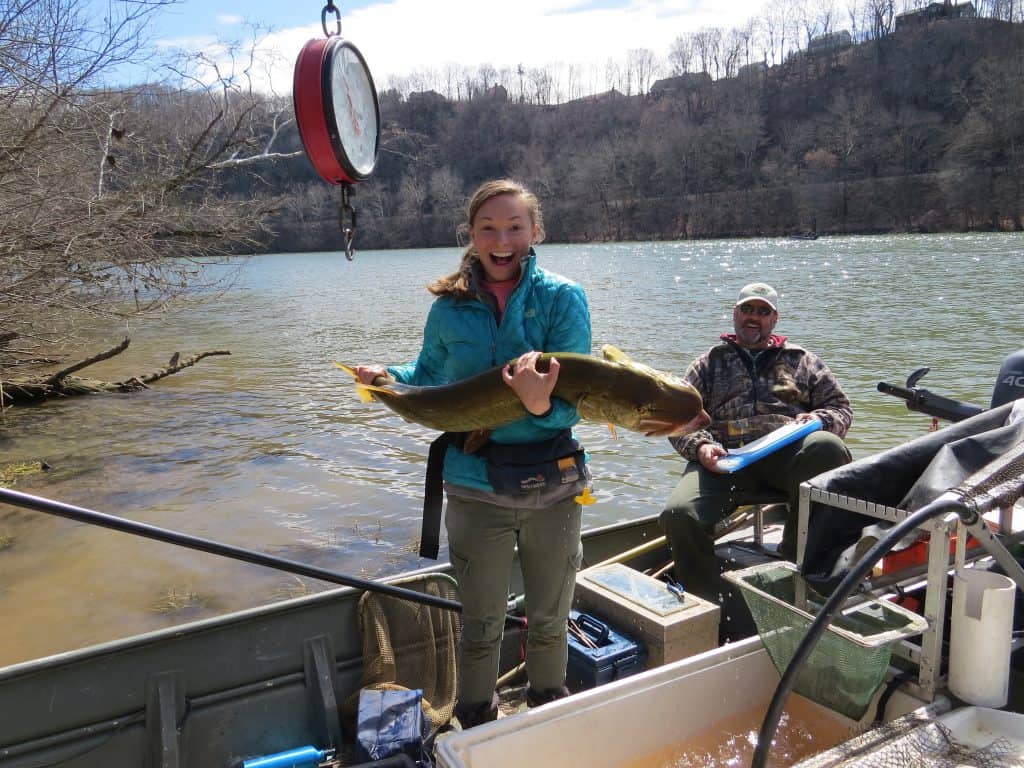One Fish, Two Fish Sasha Doss '13 is in the final stage of completing a master's degree in fish and wildlife conservation at Virginia Tech.
“Fish have amazing traits. I want to share that with people, help them feel connected to fish and help them understand how important fish are to the world we live in.”
While she readily admits that she’s terrible at fishing — “I’ve only caught a handful of fish in my life,” Sasha Doss ’13 has made the underwater creatures the focus of her graduate work.
“Fish are really cool,” she said. People often connect better with furry fauna — “bears or large cats,” for instance. “I want people to feel that way about fish.”
Doss is in the final stage of completing a master’s degree in fish and wildlife conservation at Virginia Tech. She took time between her W&L graduation and starting the master’s program to undertake an internship with the Environmental Defense Fund in San Francisco.
Doss interned for six months in the Oceans Department. “One of the major problems the department worked on was how to better manage fisheries with deficient data. Many countries and agencies just don’t have the resources for extensive data collection, but still need to make decisions. Ironically, a lot of those places are typically home to the most unique resources.” One project Doss worked on involved creating a computer-based model that could be used to stimulate coral reef systems using minimal data input.”
Since then, most of her field research at Virginia Tech has been in collaboration with Joe Williams, a biologist with the Virginia Department of Game and Inland Fisheries. They search for and study muskellunges or “muskies” in the New River to study their diet and population patterns.
Doss said that muskies were introduced into the New River in the 1960s for sport fishermen, but over time, many started to think that muskies were preying on smallmouth bass, the New River’s most popular sport fish. Through their research, Doss and Williams have concluded that muskies eat a wide variety of other fish, and that smallmouth bass make up less than 1 percent of the muskie diet.
Their research has shown that “muskies do not have a substantial predatory impact on the smallmouth bass population,” she said.
Last winter, Doss received the Robert D. Ross Graduate Scholarship, given to a graduate student in Virginia who has demonstrated academic excellence and promise for future contributions to fisheries and aquatic resource conservation.
Doss will complete work on her master’s degree this semester and then move to Washington, D.C., to begin a Sea Grant John A. Knauss Marine Policy Fellowship. Fellows are paired with a host in either the executive or legislative branch of government to work directly on marine resource policy development and application.
Doss will be placed with an executive branch agency, but won’t know her exact placement until December. Previous executive fellows have been placed in agencies such as the National Oceanic and Atmospheric Administration, the National Marine Fisheries Service and the U.S. Department of Defense.
The fellowship begins in February and will last one year. After that, she hasn’t decided on her next move. “I hope the fellowship will help me decide what side of science I want to be on,” she said. “Research or management.”
A native of Martinsville, Virginia, Doss visited W&L and “fell in love with the campus and the traditions,” she said. “All the people I met were wonderful.” She arrived as a Johnson Scholar and knew she wanted to pursue science.
Robert Humston, associate professor of biology, introduced her to the fisheries field. “He has been involved in every aspect of my early professional career,” she said. He took her to a conference of the American Fisheries Society, where she presented her research. “It was a big turning point” — the first time she felt comfortable amid a group of professional scientists. “I regularly talk to him for professional advice,” she said.
“W&L in general fosters a creative atmosphere,” said Doss. In less traditional courses for a science major, such as environmental and natural resource economics with associate professor Jim Casey, she learned new perspectives on environmental management.
Outside of class, she was a cheerleader for four years, a member of Alpha Delta Pi sorority, Beta Beta Beta biology honor society, the Lexington Literacy Campaign and Women in Technology and Science.
Doss may not be an expert at fishing, but she does like to get into the water and become one with her subject’s environment. She says diving or snorkeling on coral reefs is one of her favorite things to do. Out of the water, she and her German Shepherd, Bernard, love to hike and spend time outdoors.
Doss intends to continue her work with fish. “They have amazing traits. I want to share that with people, help them feel connected to fish, and help them understand how important fish are to the world we live in.”
—Linda Evans
If you know any W&L alumni who would be great profile subjects, tell us about them! Nominate them for a web profile.


You must be logged in to post a comment.